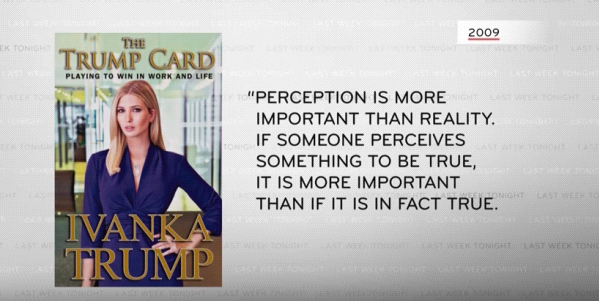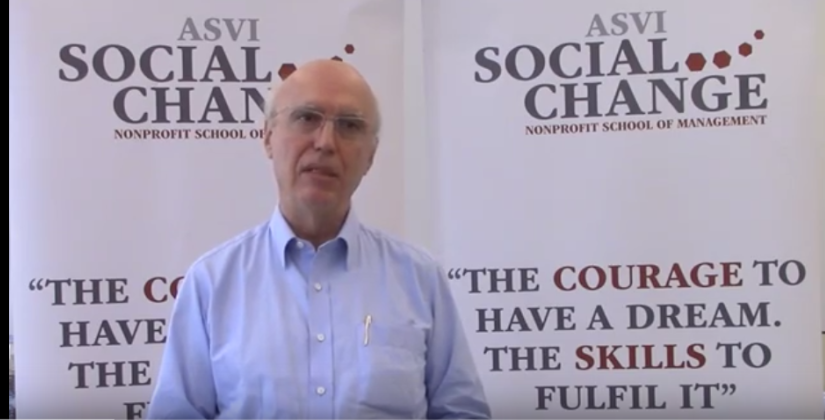By Sandro Calvani, Senior Adviser and President of the Scientific Committee of the Social Change School
Perception is more important than reality. If someone perceives something to be true, it is more important than if it is in fact true. This doesn’t mean you should be duplicitous or deceitful, but don’t go out of your way to correct a false assumption if it plays to your advantage. (Ivanka Trump) [1].
This is a quote from Ivanka Trump. When I read it, I was astonished by its clarity in declaring the acceptability of what is false.
This is how a young Ivanka Trump, daughter of the future President of the United States, described her relation with truth and false perception, her own and others’, in 2009. This statement is taken from a book-interview, authorized by Ivanka Trump; so not just an impromptu line, out of context, or just a joke that came out with her friends in the girls’ locker room. It was October 2009, and Ivanka had just turned 28, got married and converted from Presbyterian Christianity to Orthodox Judaism since 2 months.
We do not know if this quote, that has become extremely famous, had something to do with her personal life. Indeed, we all agree that when we are in love, we think our beloved is the best person in the world and we are often blind to their flaws. When in love, we prefer to believe in our own perception of reality, instead that in reality itself. And every religion has some “truth of Faith”, some facts that can’t be recognized as real with scientific or historical proofs, and therefore people of faith believe in them in the name of faith, even when a scientific analysis of those realities would suggest that they are in fact falsities. Even the second part of Ivanka Trump’s quote matches with many lovers or people of faith, that indeed do not try to correct a false perception because it plays to their advantage.
These behaviours regarding truth and false perceptions are now completely rejected by societies that are evolved in their relations with common good, management of public affairs, professionality that impact the lives and the quality of the lives of everybody. Therefore, as an example, no judge would ever allow a public prosecutor that accuses a suspect based on their own impressions and with no proof to speak in a courtroom. In the field of health, the same goes for a surgeon that thinks that lung cancer can be cured with lemon and bicarbonate: obviously he is immediately expelled from the profession. Even in situations that are much more trivial, like for example a Neapolitan pizza, the person who expresses their perspective that it’s better to put cream and strawberries on a pizza rather than mozzarella and tomato, is believed to be a jester by everyone. A person who expresses such an opinion would have zero opportunity to become a pizzaiolo.
Are these very common ostracisms against somebody else’s false perceptions a limitation of freedom of expression? Freedom of expression is a right that has been voiced from the very first experiments of democracy by Athenians and is established in many modern national constitutions, including the First Amendment of the American Constitution. However, the principles of law that stipulate limitations to the right of opinion are equally severe, and are all part of the concept that freedom of expression is not admissible when is provoking severe damage to others. This is why defamation, falsification of documents, incitement to hatred and rebellion, dissemination of false information that create panic, like those who start yelling “fire!” in a crowded place, are never permitted. Likewise, those who are in public administration and create or use false information to facilitate a decision to the detriment of other people, are punishable as forgers of public deeds in all modern judicial systems, everywhere in the world.
Yet taking advantage of false information when it plays to your own advantage, like Ivanka Trump is suggesting, on the contrary seems to be largely tolerated and certainly doesn’t seem prosecutable during political campaigns for democratic elections, and even after these same campaigns for political propaganda.
The main claims of Brexit supporters were fake, as was the accusation by Donald Trump’s supporters of Hillary Clinton trafficking children, or the belief that climate change is not real and just a machination of the Chinese government, or that the raise in immigrants raises crime rates, or to define terrorism as a major menace of our times. About terrorism, is sufficient to see that, between 2000 and 2015, terroristic attacks caused 90 deaths in UK (the most affected European country), with an average of 6 people every year. In the same country though, 120 people die every year in bicycle accidents. During the previous 15 years, 1094 people died because of terrorism in the United Kingdom, more than 10 times more, and even 2211 between 1970 and 1985. All these false statements and perceptions, that are allowed in politics and during electoral campaign because they give the advantage to a party, have become so much more than a simple advantage. In an age that is seeing political ideologies disappear, false perceptions are more and more indispensable to keep a political group united or to build an electoral win.
Freedom of opinion (or the freedom of hyperbole and exaggeration) is also the core of marketing, where advertisements stating lies are often left unpunished. Nevertheless, if for example a car manufacturer rigs the data about the emission of damaging gases, it is punished with very heavy fines. If a characteristic of a food product is false, consumers react boycotting it. Those who realize – thanks to social network – that false statements are now “environmental”, omnipresent like the air we breathe, shouldn’t be shocked by the fact that it is now a weapon used in political fights as well. And the fact that public opinion doesn’t care about politics anymore shouldn’t surprise us either, since politics are seen as a profession of falsity and corruption. Moreover, how can you trust in solutions that are proposed and voted to fix false problems?
Those who hope and aspire to politics as a noble art of public service, should first of all worry about getting laws that won’t allow and will prosecute false in electoral campaigns, at least as much as it is already forbidden in other public services, like health and justice. And a tiny little point of coherence and transparency should be recognized to Ivanka Trump, for revealing her ethical criteria, showing false perception as important and tolerable if it plays to her advantage. Thinking about it, if those who insist on making vaccinations a decision of free opinion, or those who tolerate the definition of the gravity of terrorism did the same, maybe everything would be easier to agree on. Imagine a political leader or President of Region stating: “I know perfectly well that what I am about to say is not true, but I am saying it because it plays to my advantage”.
Read also other posts by Sandro Calvani on Blog4Change.
[1] Ivanka Trump, nel libro The Trump Card: Playing to Win in Work and Life, Touchstone, Simon & Schuster, New York, 2009.




